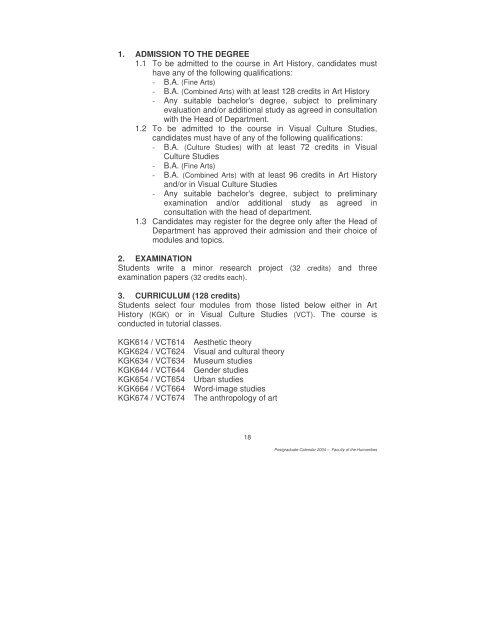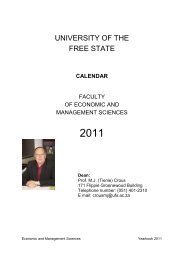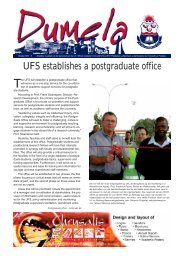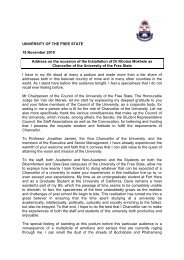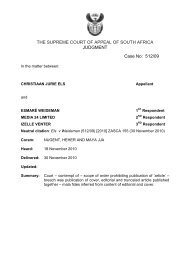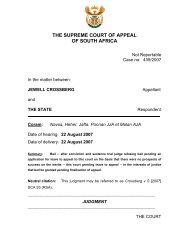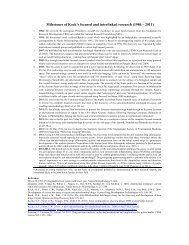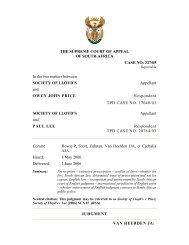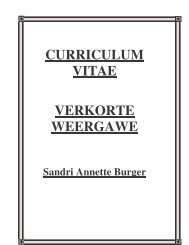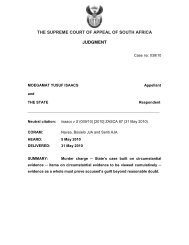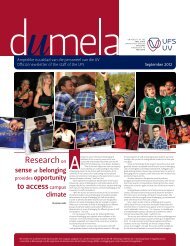Postgraduate Programmes - University of the Free State
Postgraduate Programmes - University of the Free State
Postgraduate Programmes - University of the Free State
You also want an ePaper? Increase the reach of your titles
YUMPU automatically turns print PDFs into web optimized ePapers that Google loves.
The identity-philosophical thinking deduces from this supposed identity <strong>of</strong> <strong>the</strong>subject and object <strong>of</strong> political power that a nation’s becoming subjective-objective orconscious takes place in <strong>the</strong> republican state in <strong>the</strong> consensus <strong>of</strong> <strong>the</strong> governing and <strong>the</strong>governed. Consensual governance leads to <strong>the</strong> identity <strong>of</strong> <strong>the</strong> state and <strong>the</strong>nation/people, <strong>the</strong> legislator and <strong>the</strong> legislated, <strong>the</strong> author and <strong>the</strong> addressee <strong>of</strong> <strong>the</strong> law.Through this identity <strong>of</strong> consensus, political rule is sublated or abolished andtransformed into self-government. Discourse <strong>the</strong>oretical approaches to corporategovernance transfer <strong>the</strong> consensus and identity <strong>the</strong>oretical model <strong>of</strong> politicalgovernment to <strong>the</strong> firm and its governance. They postulate that stakeholder discourseand consensus in <strong>the</strong> firm ought to be <strong>the</strong> principles <strong>of</strong> corporate governance andcontrol. 22From <strong>the</strong> viewpoint <strong>of</strong> a general anthropological <strong>the</strong>ory <strong>of</strong> human self-interestednessand <strong>of</strong> <strong>the</strong> human beings’ missing objectivity towards <strong>the</strong>mselves, <strong>the</strong> discourse <strong>the</strong>ory<strong>of</strong> human decision-making remains below <strong>the</strong> complexity <strong>of</strong> <strong>the</strong> task <strong>of</strong> controllingpower. The tendency observable in <strong>the</strong> corporatist state to collusions and coalitions <strong>of</strong>influential interest-groups or lobbyists forces one to emphasize <strong>the</strong> need for <strong>the</strong> control<strong>of</strong> political and economic power through competition, through individuals andinstitutions that come from <strong>the</strong> outside to check organizations. Hostile takeovers are one<strong>of</strong> <strong>the</strong> possible control mechanisms against mistaken forms <strong>of</strong> consensus and <strong>of</strong>coalitions between <strong>the</strong> management and <strong>the</strong> stakeholder or pressure groups within <strong>the</strong>firm. Hostile takeovers, <strong>the</strong>refore, should be ra<strong>the</strong>r encouraged than hindered by <strong>the</strong>legislation on corporate governance. A greater control <strong>of</strong> <strong>the</strong> management <strong>of</strong> large-scaleenterprises through competing management teams and <strong>the</strong>ir takeover threat will resultin an increased performance <strong>of</strong> <strong>the</strong>se firms.The need for a limitation <strong>of</strong> <strong>the</strong> consensus principle does not exclude to retainelements <strong>of</strong> <strong>the</strong> co-determination legislation as it is mandatory for German large-scaleenterprises. The option for some worker participation does not imply, however, equalvoting rights <strong>of</strong> <strong>the</strong> employees at <strong>the</strong> supervisory board level. Ra<strong>the</strong>r, it requires an endto <strong>the</strong> accumulation <strong>of</strong> power by <strong>the</strong> trade-unions in <strong>the</strong> supervisory board <strong>of</strong> large-scaleenterprises as it developed in Germa ny where many CEOs claim that <strong>the</strong>y can notdecide against <strong>the</strong> worker representation in <strong>the</strong> board dominated by <strong>the</strong> unions thatusually organize and represent <strong>the</strong> employees. Co-determination in <strong>the</strong> form <strong>of</strong>employee representation on <strong>the</strong> supervisory board does not violate <strong>the</strong> owner- orshareholder value-principle if and only if <strong>the</strong> clear majority <strong>of</strong> votes and <strong>the</strong>refore <strong>the</strong>right <strong>of</strong> <strong>the</strong> last decision remain with <strong>the</strong> owners or shareholders. At present, this is not<strong>the</strong> case in Germany. An enormous insider position has been built up by <strong>the</strong> unionssince <strong>the</strong>ir representatives sit in practically all supervisory boards <strong>of</strong> large-scaleenterprises as <strong>the</strong> representatives <strong>of</strong> <strong>the</strong> employee representation.The participation or do-determination principle can increase corporate performancewhen it understood as a principle <strong>of</strong> representation and not as a consensus principle andwhen it is instituted toge<strong>the</strong>r with <strong>the</strong> control principle <strong>of</strong> hostile takeovers. The codetermination<strong>of</strong> <strong>the</strong> employees on <strong>the</strong> board increases <strong>the</strong> learning capacity <strong>of</strong> <strong>the</strong>22 This position is taken in publication <strong>of</strong> a discourse <strong>the</strong>oretical approach to business ethics in <strong>the</strong> grouparound Horst Steinmann. Cf. Andreas Georg Scherer: Die Rolle der Multinationalen Unternehmung imProzeß der Globalisierung (The Role <strong>of</strong> <strong>the</strong> Multinational Corporation in <strong>the</strong> Process <strong>of</strong> Globalization),Heidelberg (Physica) 2003 (Ethische Ökonomie. Beiträge zur Wirtschaftsethik und Wirtschaftskultur -Ethical Economy. Studies in Economic Ethics and Economic Culture,Vol. 7).18


